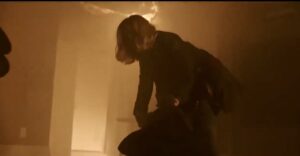In the heart of the wilderness, Evil Corp fieldworkers find themselves reminiscing about the comforts of cubicle life and the allure of an office with a view. Their current reality, however, is far from idyllic. Tasked with retrieving a teleporter who is bleeding to death from a stab wound, they face a surreal and grim situation with no paramedics in sight.
Nikolai, a menacing figure, is on the hunt for Henry, another teleporter. Henry’s memories of Nikolai are haunting; she recalls him kidnapping her father when she was a child. This revelation shatters the lie her mother told her—that her father had abandoned the family.
Cleo, meanwhile, sees through Bill Boone’s facade. His “businessman of America” persona is nothing but a front, masking his true nature. An undercover DEA agent is also in the mix, desperately seeking concrete evidence of drug and money exchanges between Bill, the Mennonites, and the police. Without this evidence, all they have are minor border violations.
The plot thickens with the discovery of classified files in Evil Corp’s database, revealing a hereditary link and a dark family history for Henry Cole. The use of satellite phones before the advent of Starlink adds another layer of intrigue.
Jenna, struggling to clean blood from a rug after a stabbing, finds an unlikely ally in Henry, who takes over the task with an eerie calmness. This darkly comedic scene underscores the surreal nature of their lives, where the macabre becomes mundane.
Henry’s internal struggle is palpable. She confesses to Jenna that something is deeply wrong with her. Normal people don’t clean bloody knives with such detachment, teleport, or endure the traumas she has faced. Her younger self even labels her a monster, a sentiment Henry cannot entirely dismiss.
Despite their bond, Henry withholds certain truths from Jenna, fearing the consequences of full disclosure. Secrets, she knows, can lead to harm and chaos.
Henry’s guilt is overwhelming. She admits her role in Amos’s death and acknowledges that if she had confided in her mother about Clay’s actions, her mother might not have turned to Bill. The resulting chain of events has left people dead and others in peril.
Sheriff Hucke’s smirk at the sight of Bill in handcuffs is short-lived. Bill, caught at last, is released by the feds for his cooperation in dismantling an international drug ring, leaving the sheriff in shock.
Lucas’s story adds another twist. His father had asked him to kill Amos for crippling Clay, but Lucas’s true motive was to gain acceptance from his brother. Bill’s approval of Lucas, as if he were Clay, adds a disturbing layer to their relationship.
Lucas, haunted by his actions, clings to Amos’s Bible, trying to understand the man he killed. This ritualistic reading is his way of seeking redemption, though it offers little solace.
In the end, Henry faces a moral dilemma. She has the power to save Clay, her assailant, from a house fire using her teleportation abilities. Despite everything, she chooses to save him, a decision that speaks to her complex nature and the blurred lines between vengeance and mercy.
